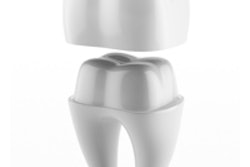Beavers have harder and more acid-resistant teeth than humans because of iron in their enamel's chemical structure, according to a new study in Science.
The researchers from the Northwestern University McCormick School of Engineering and Applied Science at looked at beaver teeth enamel at the nanoscale level and discovered that iron ions surrounding nanowires, the core enamel structure of teeth, are responsible for the added protection.
"We have made a really big step forward in understanding the composition and structure of enamel," stated lead study researcher Derk Joester, PhD, an associate professor of materials science and engineering at McCormick, in a university news article. "The unstructured material, which makes up only a small fraction of enamel, likely plays a role in tooth decay."
Unlike with magnesium ions in human enamel, the incorporation of iron ions around the nanowires of beaver tooth enamel prevents decay and also causes the reddish brown color of their teeth.
"A beaver's teeth are chemically different from our teeth, not structurally different," Joester said. "Biology has shown us a way to improve on our enamel."
The discovery could lead to a better understanding of caries and improvements of current fluoride treatments, the researchers noted.



















